

ZM Pumps - South Africa - Water Wheel Pump. Distributors : Kestrel Renewable Energy. Your search for "South Africa" returned the following results.

Telecom Techniques Street Address: 21 Burt Drive Newton Park Town / City: Port Elizabeth Telephone: +27 (0) 41 365 5073. Building Community Through Local Food. Taking up the asphalt Volunteers from Epoch Church spreading dirt Last weekend, a generous and stalwart group of volunteers from Epoch Church (Main St. btw Community Bakery and Juanita’s) joined us for two days of landscaping work.
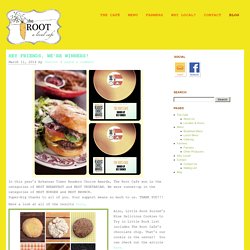
In the photo to the left, a bulldozer is taking up asphalt from the lot. We got several dumptruck loads of dirt brought to the site, and the volunteers spent much of Friday afternoon spreading the huge piles into beds. In the photo on the right several volunteers are leveling the dirt pile, while others are planting 4×4 posts for a surrounding fence. Why Local? As Americans, a lot of us think of voting as something we do once every four years, but in fact we’re voting every day with our dollars.
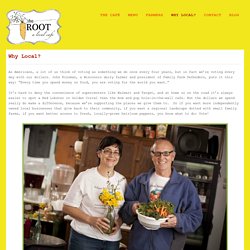
John Kinsman, a Wisconsin dairy farmer and president of Family Farm Defenders, puts it this way: “Every time you spend money on food, you are voting for the world you want.” It’s hard to deny the convenience of supercenters like Walmart and Target, and at home or on the road it’s always easier to spot a Red Lobster or Golden Corral than the mom and pop hole-in-the-wall cafe. But the dollars we spend really do make a difference, because we’re supporting the places we give them to. So if you want more independently owned local businesses that give back to their community, if you want a regional landscape dotted with small family farms, if you want better access to fresh, locally-grown heirloom peppers, you know what to do: Vote! Why Local? Small-scale farmers can contribute to food security. Small-scale farmers can contribute to food security 14:00 (GMT+2), Sun, Sunday, August 03, 2014 Some commentators might believe otherwise, but SA’s policymakers need to focus on small-scale farming.
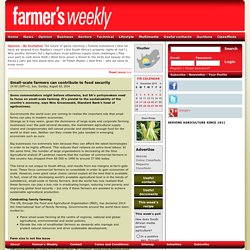
It’s pivotal to the sustainability of the country’s economy, says Nico Groenewald, Standard Bank’s head of agribusiness. Governments the world over are coming to realise the important role that small farms can play in modern economies. Strange as it may seem, given the dominance of large-scale and corporate farming businesses over the past several decades, the mainstream agricultural supply chains and conglomerates still cannot provide and distribute enough food for the world on their own. Big businesses run extremely lean because they can afford the latest technologies in order to be highly efficient.
Shining the spotlight on urban farming / Water, Land and Ecosystems Water, Land and Ecosystems. Food production globally is taking on an increasingly urban flavor, according to a new study that finds 456 million hectares—an area about the size of the European Union—is under cultivation in and around the world’s cities, challenging the rural orientation of most agriculture research and development work.
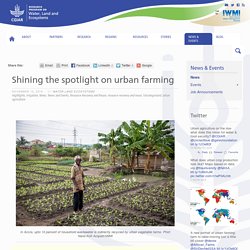
“This is the first study to document the global scale of food production in and around urban settings and it is surprising to see how much the farm is definitely getting closer and closer to the table,” said Pay Drechsel, a scientist at the International Water Management Institute (IWMI) and co-author of the study, which was published in the November 2014 issue of the journal Environmental Research Letters. The authors said their goal was to highlight the role of urban farming in the quest for food security and sustainable development, given the largely rural focus of most agriculture research and policy work. Ecosystem services and resilience framework.
Abalimi & Harvest of Hope - Cape Town, Western Cape - Non-Profit Organization - About. South Africa's urban farming revolution. Urban farms have become a growing trend in Cape Town.
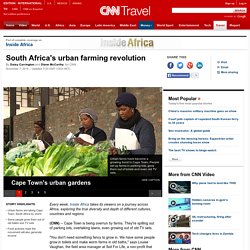
People set up farms in parking lots, grow them out of toilets and even old TV sets. Local food activists hope that by teaching locals how to grow their own vegetables, they will not only improve the city's eating habits, but provide a source of income for many. Local non-profit Soil for Life teaches 12-week gardening and nutrition courses to Capetonians. Some students attribute the lessons with changing their lives. Slow Food CSA - Community Supported Agriculture in Cape Town. Buy tickets for A tour of food-growing sites in Cape Town. OZCF Food Dialogue series is proud to invite you on a tour to experience 3 of the food-growing sites that have been discussed during the series.
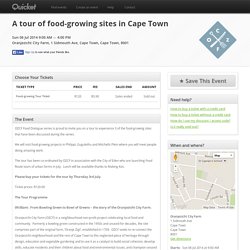
To plant a garden is to believe in tomorrow. As part of the 10-part ‘Food Dialogues’ series on the food systems in Cape Town (“a platform for sharing ideas about creating a healthier, more conscious and just food system in the Mother City”), Oranjezicht City Farm organized a tour of food-growing sites around the city.
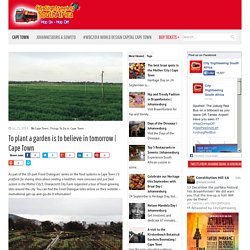
You can find the Food Dialogue talks online on their website – motivational get-up-and-go-do-it information! Oranjezicht City Farm (OZCF) is a neighbourhood non-profit project that celebrates local food, culture, and a community of individuals working together to engage in small-scale food production in the City Bowl of Cape Town. You can find the freshest organic seasonal fruits and veggies, herbs, honey, biltong, bread, plants and more at their Saturday morning markets! The tour was on a drizzly winter’s Sunday, yet the participants stayed in smiling good spirits! We began the tour at OZCF, where the active citizens/volunteers share a vision of a more self-reliant economy. . • Online at www.citysightseeing.co.za. Green NGOs leading the way.
In this week’s Cape Times newspaper column Bulelwa Makalima-Ngewana, Cape Town Partnership CEO, continues to discuss how food and sustainable food production bridges divides in Cape Town.
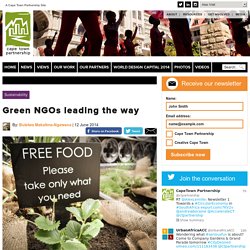
In my previous column I highlighted the issue of food insecurity and the urgent need for Capetonians to embrace urban agriculture on a citywide scale – from town to township, and across socio-economic divides. The response was immediate and overwhelming. Green Clusters. A city is in many ways like the human body: it needs a healthy diet and digestive system.
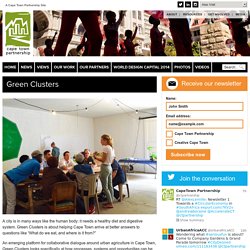
Green Clusters is about helping Cape Town arrive at better answers to questions like “What do we eat, and where is it from?” An emerging platform for collaborative dialogue around urban agriculture in Cape Town, Green Clusters looks specifically at how processes, systems and opportunities can be designed to create opportunities for healthy eating – and a healthy source of income – in Cape Town. Urban agriculture can have a positive impact on our city through job creation and by ensuring that there’s less ‘leakage’ from local economies.
It can benefit our urban environment by helping to safeguard the quality of our air, soil and water, and it can have important social benefits through skills transfer and education. Project lead: Zarina Nteta Resources: The Food Dialogues Report. Visiting the Farm - Oranjezicht City Farm. Pha report final version 31 may 2012 libre. Meet Our External Suppliers. At Harvest of Hope, we try very hard to provide an ethically and environmentally conscious alternative to the supermarket and connect our farmers to the customer, shortening the supply chain and providing income security to Cape Flats micro-farmers, all whilst providing Harvest of Hope members with fresh, chemical-free vegetables! As consumers, large-scale commercial agriculture has left us with an unrealistic expectation and unrealistic demands.
In truth, small-scale agriculture is not a perfect system – occasionally there are crop failures, pest infestations and sometimes an irrigation system may fail. As well as buying produce from the Abalimi developing farmer group (read more about our farmer devlopment chain here), we need to supplement our harvest with produce from other local, more established, peri-urban farmers within the Philippi Horticultural Area. Cape town urban.
Regenerative agriculture. Regenerative agriculture is a sub-sector practice of organic farming designed to build soil health or to regenerate soils where they are not healthy. The practices associated with regenerative agriculture are those that are identified with other approaches to organic farming, including maintaining a high percentage of organic matter in soils, minimum tillage, biodiversity, composting, mulching, crop rotation, cover crops, and green manures. Regenerative v. Organic Agriculture[edit] In the past, regenerative farming was seen as a long-term integrated approach that proponents used to build soil health, promote nutrient retention, and encourage pest and disease resistance.
Many of the practices associated with regenerative farming are management practices associated with organic agriculture. Best Practices[edit]
Moving on Empty. AFSUN 1. Urban agriculture. Publications : AFSUN – The African Food Security Network. No. 20: The State of Food Insecurity in Maputo, Mozambique (2014)Ines Raimundo, Jonathan Crush and Wade Pendleton No. 19: The State of Food Insecurity in Lusaka, Zambia (2013) Chileshe Mulenga No. 18: The State of Food Insecurity in Blantyre City, Malawi (2013) Peter Mvula and Asiyati Chiweza No. 17: The State of Food Insecurity in Gaborone, Botswana (2013) Ben Acquah, Stephen Kapunda, Alexander Legwegoh, Thando Gwebu, Tirelo Modie-Moroka, Kesitegile Gobotswang and Aloysius Mosha.
The Department of Environmental & Geographical Science. ...furthering our knowledge, understanding and management of the interactions between humans and their social, biological and physical life-support systems GEO 1009F - Introduction to Earth & Environmental Sciences Course outline:This course deals with the fundamental physical environmental elements of the earth and demonstrates the important relationships between the lithosphere, atmosphere, hydrosphere and biosphere. Topics covered include: Structure and dynamics of the Earth; stratigraphy and geological history; climatology; surface processes and evolution of landscapes; biogeography; humans and the environment.
An integrated view of the earth system is presented and there is a strong practical skills element that includes both laboratory and fieldwork. Entrance requirements: Matric Physical Science or Geography on Higher Grade, or an 'A' on Standard Grade. Projects : AFSUN – The African Food Security Network. The Department of Environmental & Geographical Science. Research Interests I am an urban social and cultural geographer with ongoing research interests through Urban Food Security as part of the CIDA funded AFSUN programme (AFSUN website) and the Formas funded 'Ways of Knowing' project, which aims to use interdisciplinary approaches to reflect on the values inherent in the management of green spaces in urban areas.
I am also a member of the SANPAD-funded project, "Healthy Cities for Children" with Children's Institute at UCT. I have particular interests in urban food systems and the construction of food security theory in Northern and Southern research contexts. I have ongoing interest in the linkages between spatial transformation and identity transformation in post-apartheid urban areas - a topic I have addressed through the lenses of youth identities, education, music and land restitution. Publications. Partners : AFSUN – The African Food Security Network. Urban Agriculture, Social Enterprise and Box Schemes in Cape Town. Spotlight: Urban agriculture. Food for the Cities: Production systems (UPA) Food and Agriculture Organization of the United Nations. How to Build 5 Different Raised Beds: Organic Gardening. Raised beds boost our vegetables above the often-waterlogged ground in the Organic Gardening test garden, which is located alongside a spring-fed stream.
Not every gardener deals with a high water table, but there are other good reasons to plant in raised beds: Urban Agriculture. ABALIMI. Anaerobic Digest « « BioCycle BioCycle. BioCycle June 2012, Vol. 53, No. 6, p. 13 Montpelier, Vermont: Energy Bill Boosts Cow Power Vermont’s newly adopted 2012 Energy Bill expands the state’s Clean Local Energy Accessible Now (CLEAN) Program (known locally as the Standard Offer Program) from 50 megawatts (MW) to 127.5 MW. Notably, the capacity of any distributed generation facility that provides “sufficient benefits to the operation and management of the electric grid” as a result of its location or other characteristics will not count towards the overall program cap of 127.5 MW. Therefore, no limit exists on the amount of clean local energy that can come online from facilities providing sufficient locational benefits.
Urban agriculture: key to food security. Organic backyard growers go big. Organic backyard growers go big. Permaculture and Organic Farming Training - Food & Trees for Africa. ResearchSpace@UKZN: Coping with food poverty in cities : the case of urban agriculture in Glen Norah Township in Harare. Upcycled Billboard Gardening. Soil For Life Public Workshops » Soil For Life. All funds raised through our workshops go straight back into the community work we do. Grow to live. Harvest of Hope. Urban Agriculture, Growing Vegetables & Organic Vegetable Gardens South Africa.
Urban farming: cultivating real change in Cape Town For many a Mother City resident, food is something taken for granted. Research. NMMU agri george. 52 eng(1) About Us. FANRPAN - Home. Research. Department of Agriculture: Western Cape: About us. CPUT - Departments and contacts. Building A Basic Aquaponics System. Aquaponics System. Aquaponics update adding worms.